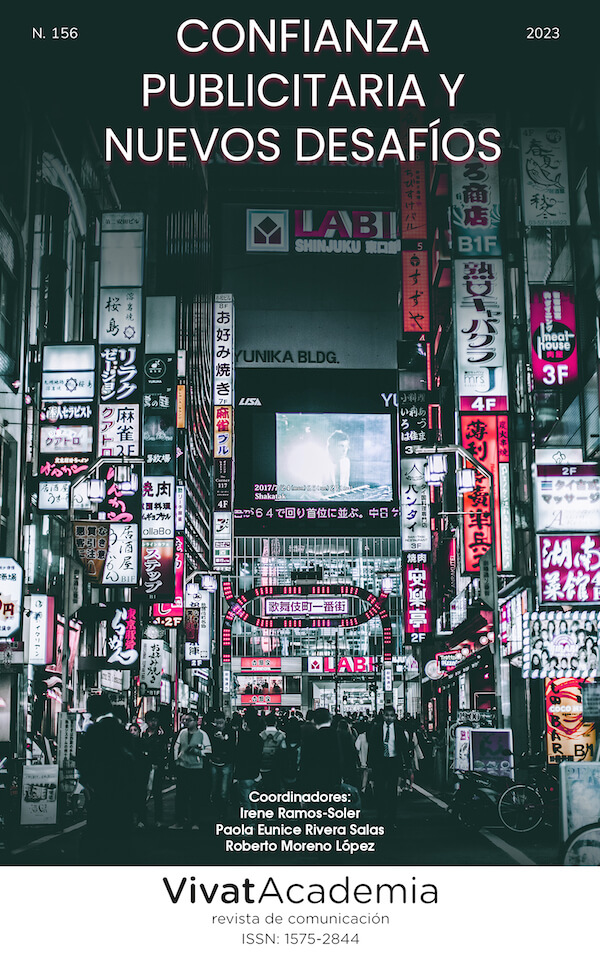Confianza Publicitaria y nuevos desafíos
Main Article Content
Abstract
The history of advertising has shown us how it evolves, mutates, changes, and adapts to social, economic, political, and cultural changes...always with a goal and purpose, to surprise, attract and seduce the different target audiences of the brands. Also, looking for efficiency and profitability. In recent years, the Internet and the new digital context have brought about a technological revolution, generating new scenarios for advertising communication, modifying existing channels, and altering content and narratives and their production and consumption. The media landscape and the strategic conceptualization of advertising campaigns have been adapting to this new situation.
The relationship between advertising and technological advances in the digital world also has a social, ethical, and legal impact that the advertising industry must consider and study in the academic field. Respecting personal information and data privacy is a critical issue. We have gone from unilateral communication dominated by the big media and governments to a knowledge society in which citizens can not only be disseminators of information but also co-create new content in previously limited ways. This global, immediate and participatory context has its diffusion characteristics and has been seen in recent years as a space for expressing and disseminating hoaxes and fake news. Having this breeding ground and using the anonymity mentioned above as a means of impunity promotes hate and intolerance online.
It is essential to point out that, in this online framework, communication on the Internet and social networks is endowed with peculiarities. Among these, particular emphasis is placed on the experience of anonymity and disinhibition by virtuality. Authors such as López and Sánchez (2019) highlight the importance of digital coexistence by proposing attitudes toward the virtual and digital world. Attitude is a crucial factor used to interact with other users. By developing and recognizing this attitude, we can identify risks that can violate intimacy and privacy in how we interact with each device. For authors such as De Haro (2019), social networks can currently form other more general independent networks that isolate them from other Internet users. These networks can be safe spaces to catalyze different human behaviors and provide new forms of communication and learning (Holcomb & Bill, 2010).
On the other hand, the changes and challenges of recent times also show us a world that is increasingly concerned about responsible, sustainable, and ecological consumption. The sustainability paradigm is also joined by equality and inclusion, the consumer ages, and we see how a growing mature target with economic power is gradually incorporated into this digital context. Since 2020, the complicated geopolitical situation, with the succession of crises and health, climate, political, war and energy emergencies, has not given up. We are facing a new economic and social reality, of a global nature that poses new challenges, to those already existing in the advertising and public relations sector. Given this scenario, it is not enough for brands to surprise and draw consumers' attention but to gain their trust and respect.
For this reason, we invite you to present original manuscripts from the field of scientific research about how communication strategies are designed and adapted by brands and the advertising industry, with the purpose of surprising, innovating, and gaining trust and respect according to the target audience, target or population segments.
Downloads
Article Details

This work is licensed under a Creative Commons Attribution-NonCommercial-ShareAlike 4.0 International License.
The main author must deliver the letter of transfer of copyright, according to the model provided by Vivat Academia, Revista de comunicación, which declares the transfer of copyright to the journal and make explicit the rights of authors regarding the dissemination and use of the manuscript once published.
Creative Commons Attribution/Non Commercial 4.0 International
References
De Haro, J. (2019). Redes sociales en Educación. https://eduredes.antoniogarrido.es/uploads/6/3/1/1/6311693/redes_sociales_educacion.pdf
Holcomb, L., & Beal, C. (2010). Capitalizing on web 2.0 in the social studies context. Techtrends, 54(4), 28-32. https://dx.doi.org/10.1007/s11528-010-0417-0
López-Berlanga, C., & Sánchez-Romero, C. (2019). La interacción y convivencia digital de los estudiantes en las redes sociales. Revista Nacional e Internacional de Educación Inclusiva, 12(2), 114-130. https://revistaeducacioninclusiva.es/index.php/REI/article/view/532/496

